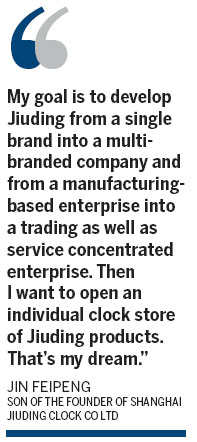Gen2 family firms look to world future
Updated: 2013-01-07 10:10
By Yu Ran in Shanghai (China Daily)
|
|||||||||||
As founders start retirement, their successors deploy new, global tactics
With the majority of private enterprises in China faced with passing on the family business to the second generation, young entrepreneurs are facing a huge challenge in taking over family brands and presenting them to the world.
According to a report presented at the end of 2011 by the All-China Federation of Industry and Commerce, about 85.4 percent of China's private sector enterprises can be classified as family businesses. As many as 75 percent will enter a period of transition from the founders to their children over the next five to 10 years.
 |
Huang Liwei, 35, was chosen to take over the business founded by his father in 1986. He started working as an ordinary employee there in 2003 and started running things after gaining thorough experience of the entire operation.
"It is extremely essential for a person from the second generation of a family business to work as a normal staff member for a certain period to get familiar with the whole production, sales and financing process before taking on a management role," said Huang, the general manager of Shanghai Yasi Electric Apparatus, a manufacturer of complete sets of high and low voltage electrical equipment with registered capital of $6.2 million.
Having graduated from Xiamen University with an executive master's in business administration, Huang had a different approach to running the business from his father, who had been exploring the domestic market over the past two decades and more.
Branching overseas
"I thought about taking Yasi out of China as a Chinese brand instead of staying as a local equipment maker as soon as possible when I took over the management of the company," said Huang.
After being appointed manager of the company in 2006, Huang started expanding the global market to cooperate with international brands to enhance production technology and ensure the quality of products.
Yasi cooperated with FKI Group, a British engineering and manufacturing company, in 2006 to produce a series of innovative electrical equipment by applying the materials, design models and techniques recommended by FKI.
One year later, a brand strategy agreement was signed between Yasi and ABB Group, the global leader in power and automation technologies, with joint production on certain items under the ABB brand.
"The company successfully obtained a good global reputation by producing promising quality products after learning from well-known global brands under joint production agreements, which was a good start for us," said Huang.
He added that insisting on manufacturing high-quality items with updated innovative technology is the only way to stand out among the tough competition in the field of low voltage electrical appliances.
Nevertheless, Huang is not just concentrating on making electrical products like his father. He is also making investments with global partners in profitable projects as a side business.
Huang bought a mine in Guangxi Zhuang autonomous region in 2011 and launched a company with Omya Group, a Swiss global leading supplier of white minerals, to exploit and develop calcium carbonate-related products.
"I would like to work on those investment projects with global leading companies to learn how to create an international brand and make money from it at the same time," said Huang.
Related Stories
Family business mirrors the country's growth 2012-06-22 13:55
Freudenberg, a family business that's now global 2012-05-21 07:48
Family business difficult to sell 2011-12-13 10:28
Swedish university targets China's family business education 2011-03-03 09:28
Today's Top News
President Xi confident in recovery from quake
H7N9 update: 104 cases, 21 deaths
Telecom workers restore links
Coal mine blast kills 18 in Jilin
Intl scholarship puts China on the map
More bird flu patients discharged
Gold loses sheen, but still a safe bet
US 'turns blind eye to human rights'
Hot Topics
Lunar probe , China growth forecasts, Emission rules get tougher, China seen through 'colored lens', International board,
Editor's Picks

|

|

|

|

|

|






